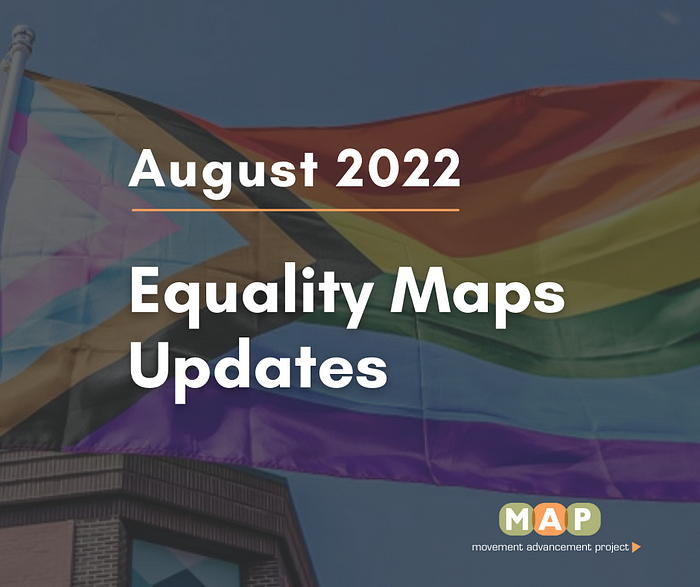LGBTQ Equality Maps Updates: August 2022
MAP’s Equality Maps provide a detailed snapshot of the current state of LGBTQ laws and policies in the United States. In this regularly changing landscape, these are the state and local policy updates as of August 2022.

▸▸ State Policy Updates
(Links in the policy updates below take you to the Equality Map for an issue or the Equality Profile for a state.)
Nondiscrimination
The Michigan Supreme Court issued a 5–2 ruling affirming that Michigan’s laws that prohibit discrimination based on sex also apply to discrimination based on sexual orientation. The ruling also agreed with a lower court’s ruling applying the same logic to discrimination based on gender identity.
This affirms that the estimated 373,000 LGBTQ people in Michigan are protected under state law from discrimination in housing, public accommodations, education, and employment.
(This ruling is consistent with the U.S. Supreme Court’s ruling in Bostock in 2020, as well as the Michigan Civil Rights Commission’s interpretive statement to the same effect in 2018.)
Healthcare
Georgia: The state of Georgia settled a case brought by the ACLU regarding the state’s refusal to cover gender-affirming surgical care in the state’s Medicaid program. As a result, Georgia’s Medicaid program will now cover gender-affirming surgery. It will also adopt further clinical guidelines for gender-affirming care and for Medicaid coverage more broadly.
West Virginia: Following a federal court ruling, West Virginia’s Medicaid program can no longer exclude coverage of gender-confirming care for transgender people.
26 states now have Medicaid policies that explicitly cover gender-affirming care.
Meanwhile, 8 states specifically exclude transgender people from Medicaid coverage.

Transgender youth sports participation bans
Indiana: The U.S. District Court for the Southern District of Indiana issued a preliminary injunction of — temporarily blocking — Indiana’s ban on transgender youth participating in sports. This allows the 10-year-old transgender girl who is the plaintiff of the case to play on her school’s softball team while the case continues to unfold. Read more here.
Pennsylvania: The governor of Pennsylvania also vetoed an attempted ban on transgender youth playing sports. This marks the ninth veto of such bans.
State-level conversion “therapy” bans
The 11th U.S. Circuit Court of Appeals effectively left in place an earlier 2020 ruling that makes conversion “therapy” bans unenforceable in that circuit (Alabama, Georgia, and Florida).
Alabama and Georgia currently have no conversion “therapy” bans in place.
At least 19 cities and three counties in Florida have these kinds of bans at the local level. Prior to the 2020 ruling, those Florida ordinances protected over 20% of the state population from conversion “therapy.”
▸▸ Local Level Policy Updates
Nondiscrimination ordinances
- Kentucky: A comprehensive nondiscrimination ordinance was passed in Elsmere, Kentucky.
There are now 24 municipalities in Kentucky (21 cities and 3 counties) with comprehensive nondiscrimination ordinances.
- North Carolina: A partial nondiscrimination ordinance was passed in Garner, North Carolina. It joined its county’s (Wake County) ordinance banning discrimination in employment and public accommodations, but not in housing.
Local-level conversion “therapy” bans
Local-level bans on conversion “therapy” were passed in:
West Virginia — West Huntington, WV (the second in the state this year, and the first in its county)
Minnesota — Northfield, MN (the first in the state this year, and the ninth in the state)
Additionally, the city of Richfield, MN, passed a resolution denouncing but not actually banning conversion “therapy.” However, the city council is expected to take up an actual ban later this year.
▸▸ Learn More
- Visit MAP’s Equality Maps: lgbtmap.org/equality-maps
- Learn tips and tricks to navigating the Equality Maps









